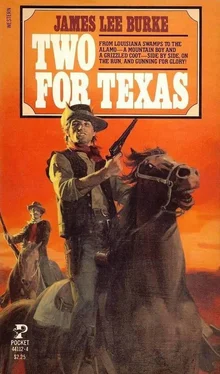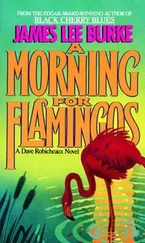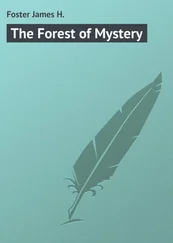It took three months for the new government to begin awarding the promised six hundred and forty acres to each Texas soldier who fought in the war. During that time Son and Hugh shoed horses at a livery stable in Bexar, worked as carpenters, guided a train of German immigrants from Matagorda Bay to the Comal River, and bought a wagonload of whiskey to sell on the Nueces, then lost it the same day when Hugh got drunk in a card game.
Hugh complained about working for wages, the delay in receiving their land, and the presence of German and Polish farmers (he called them “short necks,” built low to the ground to do stoop labor that was fit only for Mexican peons and slaves). Son tried to keep him out of the saloons, because the stories they began to hear about San Jacinto had nothing to do with the battle and were told with confidence by men who had not been there, and Hugh would become enraged and offer to fight six men at a time in the street with fists, knives, or axes.
Bexar was changed, too. The soldiers were gone, the Mexican girls sat listlessly in front of the cantina much of the day, the men in deerskin clothes with powder horn and musket were seen less and less, and livestock grazed on the short grass under the scorched walls of the mission. Then they saw the first of a new breed appear in town: the businessman with his carpetbag who spoke not simply of settling and cultivating the land but of the shipping market for vegetables that lay on the coast. And for the first time since they had been together, Son and Hugh were put in jail overnight for disturbing the peace after Hugh threw a chair into a man’s face in the saloon. The next morning Hugh threatened the lives of the jailer and the constable who had arrested them, and he was told that if he ever opened his mouth like that again he would be locked away for a month.
Hugh was hung over four days out of the week, and his reputation for drinking on the job and cursing out anyone he didn’t like (which was anyone who gave him orders) was so notorious that finally they couldn’t get work anywhere. A new saloon that was patronized by land buyers put out a sign for a barkeeper, and when Hugh applied, his clothes stained with horse dung from sleeping in a stable, he was told that he smelled like he had bathed in sheep dip and, secondly, hiring him to barkeep would be like putting an egg-sucking dog in a hen house. The damage to the bar mirror and the owner’s nose cost Hugh ten days in jail.
They were broke, and Son was thinking of selling his Kentucky rifle when they received their land deeds in late July. They each were given one-mile-square sections east of the Guadalupe and twenty-five-dollar drafts to buy farm tools and oxen. There was already a settlement of log houses called Yoakum not far from their land, and the newly arrived immigrants had plowed the fields and planted with beans, corn, tomatoes, strawberries, and watermelons. The immigrants were good farmers and worked from first light until after dark, and the earth that had never been turned by a plow was so rich that the seed burst through the top soil with the first rain.
Son and Hugh made a camp on a drainage that wound through their property and cashed their drafts in a farm implement and general store at the settlement. Hugh looked at the prices on the halters, plows, carpenter tools, and square nails, and said, within earshot of the owner, “I ain’t buying nothing from these sonsofbitches. It don’t cost half this in Bexar.”
“That’s because I had to haul it from Bexar,” the owner said.
“I reckon it gets a lot more valuable bumping up and down in a wagon, don’t it?”
“You mean you had me cash your draft and you ain’t going to buy nothing?”
Hugh took a tobacco twist out of a jar and put a dime on the counter.
“Start you a new bank with this,” he said.
They put their money in their pockets and went next door to the saloon. In the dusty light through the unshuttered windows they drank a quart of whiskey half-empty and watched the immigrant men come in for a single drink and count out their coins carefully from a purse on the bar.
“Look at that one,” Hugh said. “Dirt ground into his clothes. Don’t speak English. He probably can’t count to eleven without using his toes. And how about that head? It looks like it was cut off and glued back on again three inches shorter.”
They poured again into their glasses and stared at the dust spinning in the shaft of sunlight through the window. In the distance the clouds looked like black scorches against the blue sky.
“It’s too late in the season to grow anything, ain’t it?” Son said.
“Hell yes, it is,” Hugh said, and threw his saddle bags and then a silver dollar to the black man sweeping the floor. “Go next door and tell that thief to fill it up with jerky and two jars of honey.”
They rode north to the Brazos where the Tonkawas had been camped, but the Tonkawas were no longer there. Their conical huts had been burned and lay in ashes on the rings of stone; human and livestock bones were scattered along the river bank, and on a sandbar in the middle of the current there were skeletons still linked together that the coyotes hadn’t gotten to. They learned from a buffalo hunter that two months earlier a group of white men had attacked the village before sunlight and had killed almost a hundred people. They shot women with babies, hunted the old ones like mewing animals out of the canebrake, drove the rest into the river and cut them down in a single volley while they stood shaking on the sandbar. The buffalo hunter said the survivors had moved far north on the Brazos.
Son and Hugh followed the river for two weeks. Occasionally, they saw the unshod hoof tracks of Indian ponies or the marks of a travois stenciled deeply in the dried mud, but the signs were old and other Indians besides the Tonkawas were moving north, too. Then at a ford on the river they met some teamsters taking three wagonloads of buffalo hides to Bexar. The teamsters said that the Tonkawas were living on a drainage three days to the north but often they ran when they saw white men.
When Hugh and Son approached the camp they got off their horses and put their guns on the ground in view of the Indians, who were still too far away to recognize them. There were not more than twenty-five Indians in the camp, and most of them were old people and children. The venison rack over the fire had little meat hanging from it, and the Tonkawas no longer lived in their conical huts but instead in careless lean-tos made from piled brush. The small children, who did not remember Hugh or Son, stayed behind the legs of the older people. Son and Hugh were told that Sana had gone with her cousins to a buffalo hunters’ camp up the river to flesh hides for the salted meat the hunters gave them.
They found Sana another day’s ride to the north. She was scraping out a hide that was stretched over a willow rack, and the greasy tallow that shaved back from the knife’s edge was thick and shiny on her forearms. The hunters’ camp reeked of rotted meat. Men stripped to the waist, smelling of sweat and hides, were loading barrels of smoked tongues into a wagon. They hardly paid attention to Son and Hugh until they saw Sana stop her work and stare at them.
“What do you want?” one hunter said. He was breathing deeply from his work, and the black hair on his chest was slick with grease.
“Her,” Hugh said.
“That’s nice. What else do you want that you can’t have?”
“Get up here, Sana. We’re going on over the Red,” Son said.
“You ain’t going nowhere with her, mister.”
“You’re a dollar-making man, ain’t you?” Hugh said. “Been up here putting money in your purse while everybody else was popping caps on the Mexicans. That means you don’t tell us nothing.”
Читать дальше












